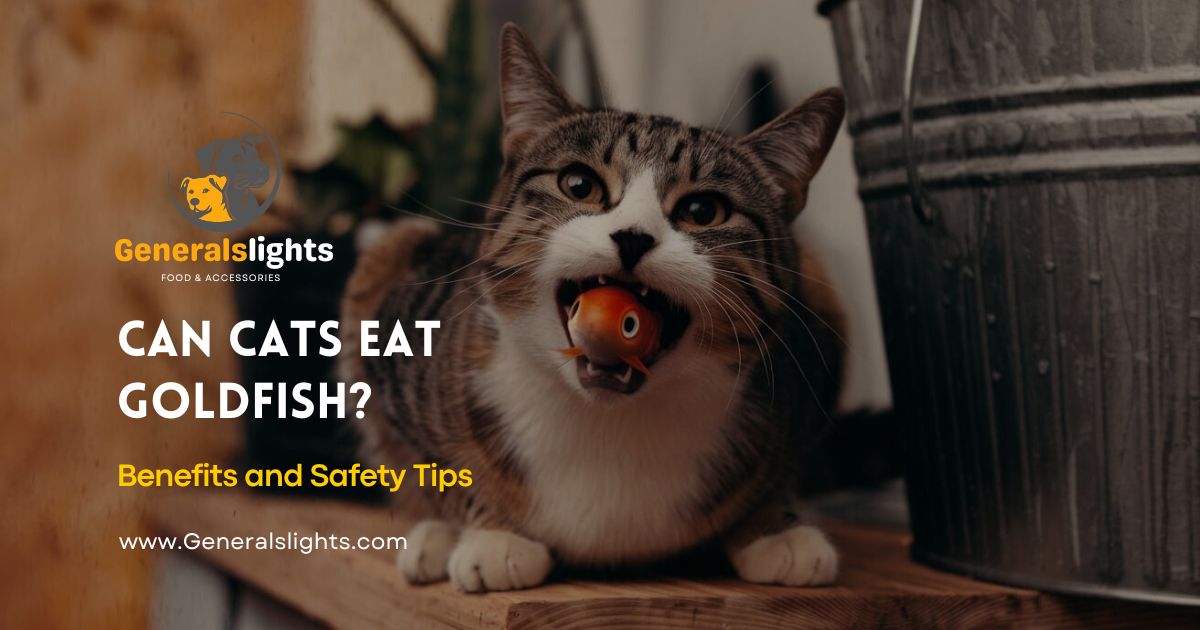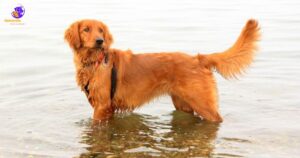Cats are natural hunters, often intrigued by the sight of fish, but can they safely eat goldfish? This article explores the risks, nutritional concerns, and alternatives to feeding goldfish to your feline friend, ensuring you make informed decisions for your pet’s health and safety. Can Cats Eat Goldfish?
Ever caught your cat eyeing the goldfish in your tank with a little too much interest? While it may seem like a harmless snack, letting your cat indulge could lead to serious health risks. Before your feline goes fishing, it’s crucial to understand the potential dangers and safer alternatives.
While cats may be tempted to eat goldfish, it’s risky. Goldfish can carry parasites and bacteria harmful to cats, and their bones pose a choking hazard. Nutritionally, they don’t offer significant benefits for cats. It’s safer to provide cat-approved fish options like salmon or tuna instead.
Understanding a Cat’s Natural Diet
Cats are obligate carnivores, meaning their diet primarily consists of meat. They require high protein and fat from animal sources for optimal health, while their bodies are not well-suited to digest plant-based foods. Their natural diet includes prey like rodents and birds.
Carnivorous Nature of Cats
Cats are obligate carnivores, relying on animal-based proteins and fats to thrive. Their digestive systems are adapted to break down meat efficiently, and they lack the enzymes needed to process carbohydrates and plant matter effectively. Their diet reflects their evolutionary hunting instincts.
Common Dietary Habits in Domestic Cats
Domestic cats typically consume high-protein, meat-based diets, whether from commercial cat food or occasional treats. They rely on proteins and fats for energy and overall health, with their food often supplemented by vitamins and minerals to meet nutritional needs.
Instinctual Hunting Behaviour
Instinctually, cats are hunters, driven by their need to stalk and catch prey. This behaviour is rooted in their wild ancestry and includes pouncing, biting, and playing with their “catch.” Even domesticated cats retain these natural hunting instincts.
Nutritional Content of Goldfish
Goldfish contain protein, fat, and some vitamins, but their nutritional value is limited for cats. They lack the complete balance of nutrients found in commercial cat food and may not provide essential vitamins and minerals cats need for optimal health.
What Goldfish Contains
Goldfish primarily consist of protein, fats, and small amounts of vitamins and minerals. They offer some nutrients but are not nutritionally complete for cats. The bones and skin can also pose risks, making them an unsuitable regular food choice for felines.
Comparing Goldfish to Typical Cat Food
Goldfish lack the balanced nutrients found in commercial cat food, which is specially formulated to meet feline dietary needs. While goldfish provide some protein and fats, they lack essential vitamins and minerals crucial for a cat’s health and well-being.
Potential Nutritional Benefits and Drawbacks
Goldfish offer minimal nutritional benefits for cats, providing some protein and fat. However, drawbacks include insufficient vitamins and minerals and potential risks from bones and parasites. A balanced cat food is preferable for meeting a cat’s complete nutritional requirements.
Risks Associated with Cats Eating Goldfish
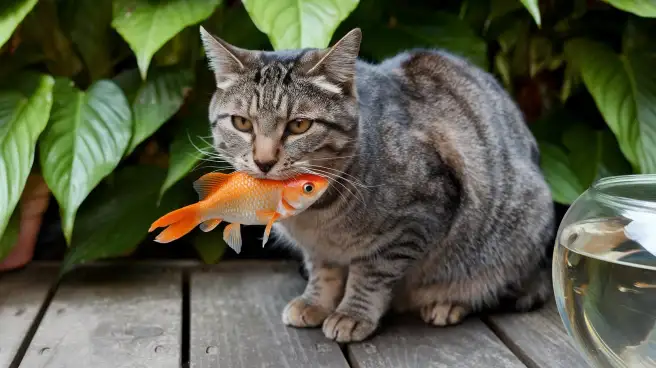
Cats eating goldfish face several risks: choking on bones, ingesting harmful bacteria or parasites, and potential digestive issues. Goldfish may also contain toxins or pollutants harmful to cats. Additionally, allowing cats to eat pet goldfish raises ethical concerns and risks stress for the fish.
Choking Hazard
Goldfish pose a choking hazard to cats due to their small bones, which can obstruct the cat’s airway. Ingesting these bones can lead to serious health issues, including blockages or injury to the digestive tract, requiring immediate veterinary attention.
Toxins and Parasites
Goldfish can carry toxins, bacteria, or parasites that may harm cats. Contaminants from their environment or improper handling can introduce risks, leading to gastrointestinal infections or other health issues. Ensuring food safety is crucial to protect your cat’s health.
Goldfish as Pets
Goldfish are often kept as pets, requiring a safe, clean environment. Allowing cats to eat them poses ethical concerns and risks stress to the fish. Proper care for both pets involves maintaining boundaries to protect each species’ well-being and safety.
Digestive Issues
Eating goldfish can cause digestive issues in cats, including vomiting, diarrhoea, or stomach upset. The fish’s bones and potential contaminants may disrupt a cat’s digestive system, leading to discomfort and requiring veterinary attention if symptoms persist.
What to Do If Your Cat Eats a Goldfish
If your cat eats a goldfish, monitor for signs of distress like vomiting or discomfort. Ensure they are hydrated and avoid feeding them more fish. Contact your veterinarian immediately for advice, especially if they show any adverse symptoms or if a large amount is consumed.
Immediate Actions
If your cat eats a goldfish, immediately check for choking or distress. Remove any remaining fish parts and offer water. Monitor your cat for symptoms like vomiting or lethargy. Contact your veterinarian right away for guidance and potential treatment.
When to Consult a Veterinarian
Consult a veterinarian if your cat shows symptoms like persistent vomiting, diarrhoea, lethargy, or difficulty breathing after eating goldfish. Immediate veterinary attention is crucial if large amounts are consumed or if your cat exhibits severe distress or unusual behaviour.
Monitoring Your Cat
Monitor your cat for signs of gastrointestinal upset, such as vomiting, diarrhoea, or loss of appetite. Observe their behaviour and energy levels closely. If any unusual symptoms persist or worsen, seek veterinary advice to ensure prompt and appropriate care.
Alternatives to Feeding Goldfish to Cats
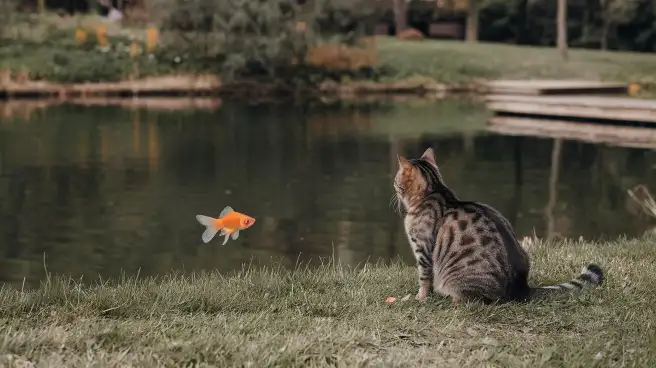
Instead of goldfish, consider safer alternatives like cooked salmon or tuna, which provide beneficial omega-3 fatty acids. Commercial cat foods with fish ingredients are also a good option, offering balanced nutrition.
You can also prepare homemade fish treats using recipes designed for cats, ensuring they receive safe and nutritious options without the risks associated with goldfish.
Safe Fish Options for Cats
- Salmon: Rich in omega-3 fatty acids and protein; cooked and boneless is safe.
- Tuna: High in protein; best in moderation and cooked or in cat food.
- Sardines: Nutrient-dense with omega-3s; ensure they are boneless and cooked.
- Trout: Good protein source; should be cooked and free of bones.
- Mackerel: Contains beneficial fats; serve cooked and without bones.
Commercial Cat Foods with Fish
Following are the names of commercial cat foods with fish are mentioned below;
- Hill’s Science Diet
- Royal Canin
- Blue Buffalo Wilderness
- Purina Pro Plan
- Nutro Wholesome Essentials
- Wellness CORE
- Merrick Purrfect Bistro
- Iams ProActive Health
- Natural Balance L.I.D.
- Victor Hi-Pro Plus
Homemade Fish Treats
- Baked Salmon Bites: Mix cooked, flaked salmon with whole wheat flour and egg, then bake until firm. These treats are high in protein and omega-3 fatty acids.
- Tuna Catnip Balls: Combine canned tuna (in water) with oat flour and a bit of catnip, then form into small balls and bake. These are tasty and engaging for your cat.
- Fishy Freeze-Dried Treats: Purely cooked fish like mackerel or trout and freeze into small cubes. These treats are easy to store and offer a crunchy, nutritious snack.
Preventing Your Cat from Eating Goldfish
To prevent your cat from eating goldfish, ensure the tank is securely covered and out of reach. Provide engaging toys and enrichment to distract your cat.
Train your cat to stay away from the tank using positive reinforcement. Regularly monitor your cat’s behaviour around the aquarium.
Goldfish Tank Safety
Ensure goldfish tanks have a secure lid to prevent cats from accessing the water. Place the tank in a location out of reach or in a room where cats are not allowed. Regularly check for any signs of tampering or interest from your cat.
Distraction Techniques
Use interactive toys, puzzle feeders, and regular play sessions to keep your cat engaged and distracted from the goldfish tank.
Providing scratching posts and climbing structures can also divert their attention. Engaging in activities will help reduce their focus on the fish and alleviate boredom.
Training Tips
Train your cat to avoid the goldfish tank by using positive reinforcement. Reward them with treats and praise for staying away from the tank.
Use commands like “leave it” or “no” consistently. Pair training with environmental enrichment to keep your cat mentally stimulated and less interested in the fish.
The History of Cats and Fish in Their Diet
Historically, cats have been associated with fish due to their natural hunting instincts and the availability of fish in various cultures. Ancient Egyptians, Greeks, and Romans often depicted cats with fish, reflecting their role as both hunters and companions. In modern times, fish has become a common ingredient in commercial cat food, mirroring these historical associations.
Ancient Connections
In ancient cultures, such as Egypt and Greece, cats were often depicted with fish, symbolizing their hunting skills and the importance of fish in their diet. These images highlight the long-standing connection between cats and fish throughout history.
Modern-Day Practices
Today, fish is commonly included in commercial cat food due to its high protein content. Modern practices balance historical dietary habits with nutritional science, offering fish-based cat foods that provide essential nutrients while catering to the cat’s natural preferences and health needs.
Psychological Impact of Goldfish Consumption on Cats
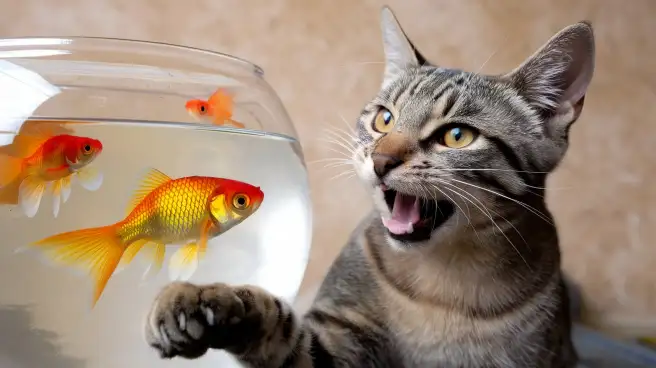
Consuming goldfish can impact a cat’s psychology by heightening their hunting instincts or causing stress if the fish is a pet.
The act may also reinforce predatory behaviour, making cats more likely to target other small creatures or objects in their environment.
Behavioural Changes
Eating goldfish may heighten a cat’s predatory behaviour, making them more aggressive or obsessive towards other small animals.
It can also cause stress or anxiety if the goldfish is a beloved pet, affecting the cat’s overall behaviour and mood.
Hunting Instincts vs. Domestic Living
| Hunting Instincts | Domestic Living |
| Cats are driven to stalk and catch prey, a behaviour rooted in their evolution. | Domestic environments can limit their ability to fulfil these instincts naturally. |
| Hunting behaviours provide mental stimulation and physical exercise. | Inadequate stimulation may lead to boredom or stress-related behaviours. |
| Hunting behaviours provide mental stimulation and physical exercise. | Enrichment activities, like toys and interactive play, can help manage these instincts. |
Ethical Considerations for Pet Owners
Allowing cats to eat pet goldfish raises ethical concerns, as it can stress or harm the fish. Pet owners should consider the well-being of all animals involved, ensuring that fish are kept in safe environments and cats are provided with appropriate, safe alternatives.
Moral Dilemmas
Feeding goldfish to cats raises moral dilemmas, including the ethical treatment of pet fish. It can cause undue stress and harm to the fish, conflicting with responsible pet ownership principles.
Balancing Pet Needs
Balancing pet needs involves ensuring the well-being of both cats and fish. Provide enriching activities for cats and a safe, stress-free environment for fish to meet the needs of all pets.
Experiences from Pet Owners
Positive Experiences
- Some pet owners successfully redirect their cats’ attention from goldfish using interactive toys and enrichment.
- Proper tank covers prevent cats from accessing the goldfish, keeping both safe.
- Training cats with commands like “leave it” reduces their interest in fish.
- Providing alternative treats keeps cats satisfied and less focused on goldfish.
- Enriching cat environments with climbing trees and puzzle feeders helps prevent boredom.
Negative Experiences
- Cats may harm or stress pet goldfish, leading to health issues or death.
- Instances of cats eating goldfish cause digestive problems, requiring veterinary intervention.
- Some pet owners struggle with balancing safety and enrichment, causing frustration.
- Fish tanks without secure lids often result in cats accessing and harming goldfish.
- Lack of proper training or distraction leads to persistent issues with cats targeting fish.
Myths and Misconceptions About Cats Eating Fish
Myths about cats eating fish include the belief that all fish are safe and beneficial for cats and that eating fish can satisfy their nutritional needs completely. In reality, many fish, including goldfish, pose risks due to bones and potential toxins. Cats require a balanced diet tailored to their specific nutritional needs, and fish should be served in moderation and properly prepared.
Fact vs. Fiction
| Fact | Fiction |
| Fish offers essential nutrients when cooked. | All fish are safe for cats. |
| Fish is a common, healthy ingredient in cat food. | Fish alone is a complete diet. |
| Cooked fish is safer for cats. | Raw fish is fine for cats. |
| Fish should be an occasional treat. | Fish should be a primary food. |
| Removing bones makes fish safer. | Bones in fish are harmless. |
Vet-Recommended Diets for Cats
The veterinary guidelines and role of fish recommended by vets in a cat diet are described below;
Veterinary Guidelines
Vets recommend a balanced diet high in protein, with essential fats, vitamins, and minerals. A complete commercial cat food usually meets these needs, ensuring overall health and well-being.
Role of Fish in a Vet-Approved Diet
Fish can be a beneficial component in a cat’s diet, providing protein and omega-3 fatty acids. However, it should be served in moderation and as a balanced diet.
Fish in Commercial Cat Food
Following are the guidelines described as follows;
Ingredient Analysis: Fish in cat food often provides high-quality protein and omega-3 fatty acids, contributing to a balanced diet.
Type of Fish: Look for specific fish types like salmon or tuna; avoid vague terms like “fish meal.”
Nutritional Balance: Ensure the food lists fish as one of the top ingredients and includes other essential nutrients.
Avoid Fillers: Check for the absence of fillers and artificial additives that may dilute the nutritional value.
Allergen Information: Be aware of any potential allergens; choose products with clearly stated ingredients to avoid adverse reactions.
Environmental Impact of Feeding Fish to Cats
Feeding fish to cats can impact marine ecosystems; choose sustainably sourced fish to reduce environmental harm and support responsible practices.
Sustainability Concerns
Sustainability concerns include overfishing and environmental damage caused by fishing practices. Opt for cat foods with sustainably sourced fish to support responsible fisheries and minimize negative impacts on marine ecosystems.
Ethical Sourcing
Ethical sourcing involves selecting fish from fisheries that follow sustainable practices, ensuring minimal environmental impact and fair treatment of workers. Look for certifications like MSC or ASC on cat food labels for assurance.
FAQs
Can cats eat goldfish?
Yes, in moderation and as an occasional treat.
Are goldfish safe for cats to eat?
Yes, but they offer minimal nutritional benefits.
Can eating goldfish cause health issues in cats?
Excessive eating may cause digestive problems.
What should I do if my cat eats a goldfish?
Watch for symptoms and consult your vet if needed.
Are there any benefits to feeding goldfish to cats?
No significant benefits; stick to balanced cat food.
Conclusion
In conclusion, while goldfish might attract your cat’s curiosity, they pose risks and are not nutritionally suitable. Opt for safe fish alternatives and balanced cat foods. Ensuring ethical practices and providing proper enrichment will help maintain your cat’s health and well-being while protecting other pets.
Read More :
- Can Dogs Eat Potato Salad
- Can Dogs Eat Meatballs
- Can Dogs Have Waffles
- Central Asian Shepherd Dog Health Problems

Emerson is an expert in the world of pets, specializing in understanding diverse breeds, nutrition, and health. His deep knowledge ensures your pets receive the best care, from balanced diets to top-notch health advice, keeping them at their happiest and healthiest.
